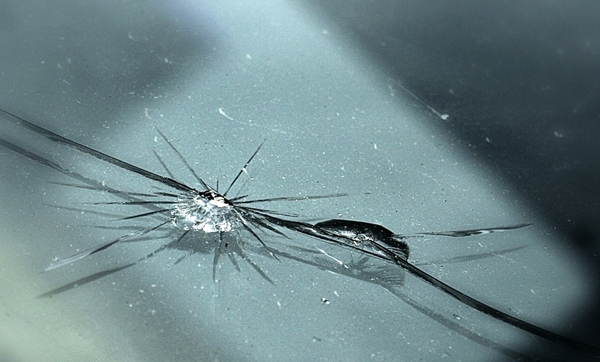How to Stop a Windshield Crack from Spreading
Windshield cracks are an unnerving sight for any driver. Even small chips can quickly turn into dangerous, spiderweb-like cracking that makes it difficult to see out of your windshield. If you're lucky, the crack will stay contained within a single pane of glass; but more often than not, the damage spreads and compromises multiple pieces of your windshield ... especially if you ignore it. Fortunately, there are measures you can take to stop a crack from spreading through your entire windshield, or at least slow down its growth until you have time to get it repaired properly. Here's how:
1) Assess the Damage
The first step is to inspect the damage—if possible—and then determine just how bad it is. The National Windshield Repair Association offers a simple test. If you can stick a business card in the crack and slide it back and forth, your windshield is safe to drive on for now—but should still be repaired as soon as possible. If the cracks are smaller than a credit card, but you can't push a business card through them, they're too small to repair—and may not cause any problems driving on them. But if you can't fit a business card into the scratch at all, or there's more than one crack, stay off the road immediately. It's not worth risking your safety trying to make it home or to another shop.
2) Seal the Crack
If necessary, keep driving until you find an auto body shop that can properly fix the damage. Then, get out your stone guard—a car wax designed to protect against rock chips and cracks in windshields. Stone guard prevents cracks from spreading by sealing them off, but it's best to take care of the problem sooner rather than later. Use a small squeegee to apply the product over the crack and make sure you work it into any hairline fractures, too (just don't apply too much; the stone guard isn't meant for big patches).
Take preventive measures: Once you've fixed or sealed your crack, try not to leave yourself exposed again. Use a car cover if necessary—you'd be surprised how many chips and scratches can accumulate on your car when exposed to even moderate weather conditions like sunshine and rain.
3) Have it Professionally Repaired
If the damage is too widespread to fix with a stone guard, or if your car cover just can't keep up with the damage, take your vehicle to the shop and have them replace the windshield completely. If you wait until after one of your panes has cracked, there's a chance that more than one piece of glass will need to be replaced—which will cost you more money in both time and supplies. Make working on chips and scratches a priority so that you don't have to incur extra charges down the road.
However, if the damage is extensive and you don't particularly want to replace your windshield, consider having it repaired. While repairing a windshield is typically half as expensive as replacing one, you'll usually need to wait at least several days for the average auto glass company to order your replacement. For small chips and cracks that are still relatively minor, this might be an option—but consider the fact that you may not realize how much of an impact a tiny crack can make on your visibility until you get behind the wheel and try driving with it.
Windshield repairs vary in method and cost depending on what kind of damage has been done. Here's a quick look at some common problems—and solutions:
Cracks smaller than a dollar coin are usually just surface damage caused by flying debris, which can be filled in. However, any cracks over three inches long will compromise the integrity of your windshield and should be replaced immediately.
Hail damage can reveal itself when you least expect it—after all, that's what the name implies. The effects range from small dents to massive pits, but the takeaway is always the same: Your glass needs to be fixed or replaced. If it hasn't shattered outright (remember: if you see pieces of glass on your dashboard or seats, even if they're still intact in their pane, don't drive), consider taking these steps before seeking professional help: Cover up any broken pieces with tape or paper to prevent them from falling out or rolling around, turn on your defroster to full blast, open the sunroof to release any pressure that might be building up inside the car, and safely pull over.
Westchase, FL

